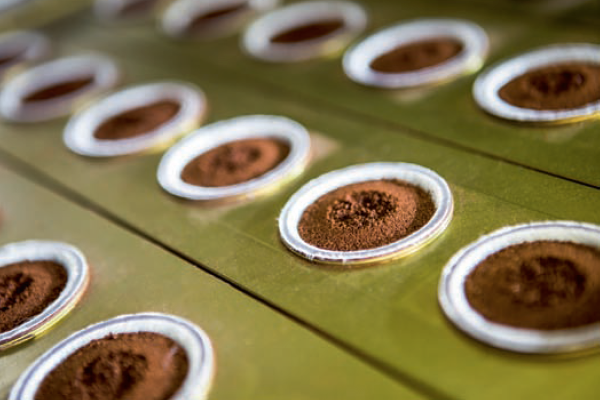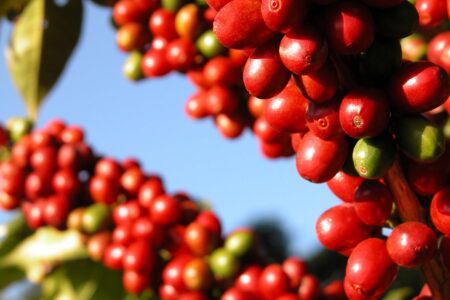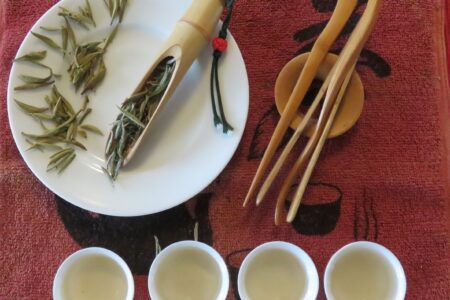Mother Parkers Embarks on the Adventure of Single Serve

Mother Parkers’ desire to enter the single serve market with a sustainable, cost effective capsule, led to the development of the EcoCup, an eco-friendly capsule that is better for the environment, and which has transformed the company’s business strategy.
By Anne-Marie Hardie
Founded in 1912, Mother Parkers Tea & Coffee has established itself as a leader in the coffee and tea industry. With over a century in operation, the business has gone through several iterations. However, there was perhaps no greater adventure than their journey into the world of single serve.
Mother Parkers single serve story began simply. In 2008, Paul Higgins Jr and Michael Higgins, co-chairmen and CEOs of the Mississauga, Ontario-based company, wanted to enter the rapidly growing segment of the coffee industry. Little did they know, their new format offering would evolve into a ground-breaking discovery and further define Mother Parkers as innovators.
The team’s mandate was clear: produce a sustainable, cost effective capsule that delivered exceptional quality. “In the beginning, there were only four of us,” shared Liberatore Trombetta, vice president, research and development. “We used every spare moment and space to brainstorm what Mother Parkers’ single serve solution would look like.” With a fixed launch date in mind and minimal resources, the most logical path was not to reinvent.
However, they would quickly discover that was simply not an option. Although not yet its own division, research and development had become an integral part of the company’s operation. In 2009, Mother Parkers, which had often turned towards the University of Guelph in Guelph, Ontario for insights, established a research and development relationship with them which included researching several aspects of the industry including packaging, roasting and eventually, single serve. Furthermore, the single serve team at Mother Parkers had recently hired University of Guelph PhD scientist, Yucheng Fu, who played an integral role of the development of the single serve prototype.
A Deep Dive into Filter Technology
Over a period of six months, the research team experimented with over 200 filters, which they adhered with an elastic to a 3D prototype capsule, but there wasn’t one that met their needs. Within 43 seconds (the average time for a Keurig brewer), it was hard to deliver a coffee that was comparable to a drip brewer. To address the quality issue, the team would need to develop a filter that could respond to the challenges of a single serve system.
“It required a paradigm shift regarding how you filter,” said Trombetta. “Our team experimented with several different materials, until we accidentally received inspiration from another field of use, diaper technology.” Unlike paper, the non-woven technology didn’t absorb. This meant that all the aspects of the liquid, including the lipids and acids, would get into the cup providing both body and brightness, and in turn, a better cup. This led to the development of the proprietary Flavor Max filter technology, which was inspired by the non-woven technology used in diapers. “When you start something from scratch, with absolutely nothing, there are no rules. At the end you have a product that is truly yours,” said Fred Schaeffer, president. “The sense of fulfillment at the end is a massive wow! It’s a once a career kind of thing.”
Word quickly spread about the single capsule that promised to deliver drip coffee quality. “When success came early then it was like hurry up and get it done, we pulled every able body into the project,” said Trombetta. “There was so much to do, it was kind of like trying to clean your home while you had a party going on.” To bring the capsule to fruition, the team needed to forge partnerships with suppliers, hire additional employees and create standard operating procedures for machinery that didn’t yet exist.
“The capsule needs to withstand the pressure due to the release of carbon dioxide; on the other hand, it needs to perform as a device to enable the brewing process. It is a complicated component,” said Loong-Tak Lim, PhD, associate professor, department of Food Science, University of Guelph. If the polymer is not optimal, the capsule can be impacted, even the puncturing point can impact the final product, as the nozzle needs to penetrate the capsule without creating any damage. “It is such a small item, but there are so many potential challenges,” said Lim. “One of the biggest challenges is ensuring the integrity of the seal, because if it is not done properly it can negate the benefits of the polymers.”
Working Against All Odds
Due to highly restrictive contracts for North American equipment suppliers to other single serve capsule manufacturers, Mother Parkers turned to Europe for its equipment partners, one of which was Sarong SpA, Reggiolo, Italy. Sarong was tasked with designing, producing and testing a new machine in less than five months. However, this wasn’t the only challenge that the company would be confronted with. In May 2012, two months into production, two major earthquakes hit the region. All 100 employees were safely evacuated, but the damage to both the building and Mother Parkers’ equipment was extensive.
“We started to reassemble the two Mother Parkers machines in mid-June,” said Alberto Bartoli, vice president, Sarong SpA. “At the time, the delivery deadline of early July seemed impossible.”
With the new building still under construction, the 40 office employees, worked in a large tent, equipped with both their computers and printers. While the mechanical assembly, was stationed in a nearby warehouse building. “We worked almost 24/7 to get the job done,” said Bartoli. “The lines were shipped on 10 July and the equipment was installed in Mississauga on the 21st of the month.”
The Sarong mechanics and engineers travelled to Mississauga to assist with the final build and assembly, making any final modifications on-site, including hand delivering drawings to a local machine shop to make and modify parts. “It was an incredible feat to have the line running in August and a great example of cooperation between the two companies,” said Trombetta. This collaborative effort set the foundation for a strong working relationship between the two companies, culminating in Mother Parkers urging Sarong to open a Canadian office. The first Canadian Sarong office was housed in the Mother Parkers’ warehouse space. Sarong eventually expanded from the Mother Parkers’ warehouse to its own location where it services both Mother Parkers and additional clientele.
The Evolution into EcoCup
The first capsules came off the line in 2012, shortly after Sarong’s equipment installation. Mother Parkers wanted all the components of the single serve capsule to be manufactured at its own facility. The plant design is vertically integrated with all the manufacturing components done in house. Packaging is brought in on roll stock that is then formed on site. Between 2014 and 2015, the plant rapidly expanded in response to the high interest in EcoCup. “By making something in-house we improve our CO2 footprint,” said Trombetta. “Developing all our own equipment allowed us to build the right components, including the click feature.”
The click feature satisfied two recycling requirements: a clean stream for recycling with zero mixed materials and easy separation for the consumer. “One challenge with recycling capsules is that they consist of multiple polymers within a single capsule, including a unique polymer for the body and one for the barrier to protect against oxygen,” said Lim. “If the body is produced with one polymer alone it would greatly decrease the shelf life.” The EcoCup capsule is easily separated by the consumer, the polystyrene 6 capsule recycled, and the organic matter composted. However, recycling single serve is far from a simple process.
The Present: Recycling Challenges
As of January 2018, China, which purchases about two-thirds of North American recyclables, has set the requirement of a contamination level under 0.5 percent. “We’ve spoken with various government agencies and ministries, and they’ve advised us that any amount of contamination could make the product useless,” said Schaeffer. “They were thrilled to hear about the properties of our cup, and how it can easily be separated ensuring a clean product.”
Although the EcoCup addresses strict recycling standards, there are still road blocks preventing the capsules from being municipally recycled. “If they say coffee capsules are allowed in the blue box, the consumer isn’t going to understand which capsule can go into recycling and which cannot,” said Schaeffer. “We need to provide the right message to the consumer when it comes to recycling, with the main one being, make sure it’s clean.” Mother Parkers is deeply invested in achieving its sustainability goals. This includes continual discussions with governments, municipalities, and private companies to develop a solution that would keep single serve capsules out of the waste stream.
When asked about the future, Trombetta laughed, stating that they never get a break, as there is always another level to go. However, the recent news from China about the recycling restrictions has affirmed that Mother Parkers’ innovation needs to be without borders. “We need to be aware of what is going on in the world, and how can we best help them,” he said
When it comes to capsule growth, Mother Parkers is actively looking at other formats, including developing single serve espresso capsules to respond to this sector of the industry. From a research perspective, cold brew presents an intriguing challenge for Mother Parkers. “The process today is really suboptimal, it’s very manual, messy and labour intensive,” said Schaefer. “We are currently researching how to innovate this offering, we don’t want to just say we have a product too, but instead provide a solution to the entire system.”
Mother Parkers’ single serve division has helped redefine its entire business strategy.
It is the sense of innovation, and the deep responsibility to get all the details right, which was acquired during this journey, that continues to take the company to the next level.
Anne-Marie Hardie is a freelance writer, professor and speaker based in Barrie, Ontario. She may be reached at: [email protected].




The story of Mother Parkers Tea & Coffee’s foray into the world of single serve is a testament to their commitment to innovation and sustainability. Facing the challenge of entering a rapidly growing segment of the coffee industry, the team embarked on a journey to create a sustainable and cost-effective capsule while maintaining exceptional quality. Despite limited resources and a fixed launch date, they opted not to reinvent the wheel but instead focused on leveraging existing knowledge and resources to develop their single serve solution. This pragmatic approach underscores their adaptability and resourcefulness, ultimately leading to a ground-breaking discovery that further solidified their reputation as innovators in the industry. It’s a reminder that sometimes the most effective solutions come from maximizing the potential of what already exists.